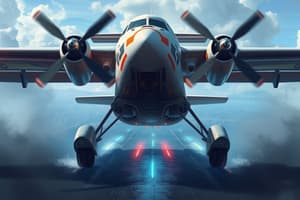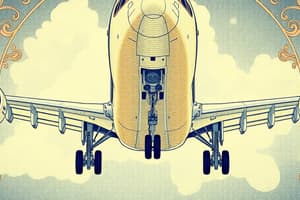Podcast
Questions and Answers
What is a key advantage of the tricycle landing gear configuration?
What is a key advantage of the tricycle landing gear configuration?
- It requires more main wheels for support.
- It is suitable for helicopters.
- It increases the distance between the prop and the ground.
- It allows for easier ground handling. (correct)
Which of the following describes a disadvantage of the tail wheel landing gear design?
Which of the following describes a disadvantage of the tail wheel landing gear design?
- It offers better shock absorption.
- It is difficult for ground maneuvering. (correct)
- It limits the number of wheels used.
- It requires hydraulic steering systems.
What does the term 'bogie' refer to in aircraft landing gear terminology?
What does the term 'bogie' refer to in aircraft landing gear terminology?
- A type of hydraulic steering system.
- The tail wheel mechanism.
- The attaching mechanism for multiple wheels on a single strut. (correct)
- A landing gear configuration for helicopters.
Which aircraft type primarily utilizes skid landing gear?
Which aircraft type primarily utilizes skid landing gear?
In a tricycle landing gear configuration, where are the main wheels located?
In a tricycle landing gear configuration, where are the main wheels located?
What mechanism is typically used for steering tail wheel landing gear?
What mechanism is typically used for steering tail wheel landing gear?
What is a defining characteristic of tandem wheel configurations?
What is a defining characteristic of tandem wheel configurations?
Which type of landing gear is known for being used alongside large props to prevent contact with the ground?
Which type of landing gear is known for being used alongside large props to prevent contact with the ground?
What is the primary purpose of floats on an aircraft?
What is the primary purpose of floats on an aircraft?
How do amphibians differ from traditional aircraft?
How do amphibians differ from traditional aircraft?
Which type of landing gear is most commonly used in small aircraft and why?
Which type of landing gear is most commonly used in small aircraft and why?
What typically supports the wings of flying boats?
What typically supports the wings of flying boats?
What is a unique feature of helicopter skis, commonly known as ‘bear paws’?
What is a unique feature of helicopter skis, commonly known as ‘bear paws’?
What type of shock absorber is the most common in aircraft landing gear?
What type of shock absorber is the most common in aircraft landing gear?
What is the function of rudders on floats during low-speed maneuvering?
What is the function of rudders on floats during low-speed maneuvering?
Which term is used to describe aircraft that operate effectively on both land and water?
Which term is used to describe aircraft that operate effectively on both land and water?
Flashcards are hidden until you start studying
Study Notes
Landing Gear Purpose
- The primary purpose is to absorb shock during landing and allow for ground steering.
Landing Gear Types
- The first type of landing gear was skis used on the Wright Flyer.
- The first aircraft with wheels used a tricycle landing gear configuration.
- Tricycle gear consists of a main wheel pair behind the Center of Gravity (CG) and an auxiliary wheel under the nose.
- Tricycle gear replaced Tailwheel landing gear, which had become popular as engine technology allowed for powerful radial engines and large propellers that required a greater distance between prop and ground.
Tailwheel Configuration
- Tailwheel configuration is considered "conventional gear"
- Rudder pedals are connected to the tailwheel via cables and springs.
- Tailwheel is fully castering, locking in position for takeoff and unlocking in position for landing.
- Requires independent braking to steer.
Nose Wheel Configuration
- Most popular type.
- Nose wheel connected to rudder for steering.
- Some large aircraft utilize hydraulics for steering.
- Some have independent steering wheels or yokes for ground maneuvering.
Main Wheels
- Number and location vary depending on aircraft type.
- Some main gear have two wheels.
- Multiple wheels spread weight over a larger surface.
- Multiple wheels provide a safety margin if a tire fails.
- Heavier aircraft may have 4 or more wheels.
- A "boggie" or "truck" mechanism is used to attach multiple wheels to a single strut.
Tandem Wheel Configuration
- Main gear is in line down the center of the fuselage.
- Examples include Gliders and Harrier jets.
- Uses outrigger wheels to support the wings.
Skids
- Primarily found on helicopters.
- Has been used on fixed-wing aircrafts.
Four Wheel Landing Gear
- Used on helicopters.
- Wheels typically castering.
Ski's
- Used for operation on snow.
- Two styles:
- Wheel can be removed, and a ski placed in its place.
- Ski goes on over the wheel, sometimes allowing the wheel to protrude through the ski.
Helicopter Ski's
- Called "bear paws".
- Attach to skids and widen the ski profile to prevent sinking into snow.
- Function more like "snowshoes".
Hulls
- Referred to as "flying boats".
- Have outrigger pontoons to support the wings.
Floats on Helicopters
- Used for emergency water landings or as main gear.
Floats on Fixed-Wing Aircraft
- Primary purpose is to land and takeoff on water.
- Consist of two large pontoons supporting the aircraft's weight.
- Use rudders for low-speed steering.
- Rudders retract for high-speed stability.
- Some have one large float and two smaller outrigger floats at the wingtips.
Amphibians
- Aircraft that can operate on both water and land.
- Consists of floats with protruding wheels, or retractable wheels for water operation.
- "Flying Boats" are a type of Amphibian.
Fixed Gear
- Most small aircraft use fixed gear.
- More efficient at slower speeds.
- Weight savings minimize drag even with streamlined "pants".
- Direct attachment to the aircraft structure.
- Shock is absorbed by tire elasticity.
Fixed Bungee Cord
- Uses rubber to cushion shock loads.
- Includes rubber donuts or bungee cords.
- Bungee cords absorb both landing and taxi loads.
Fixed Shock Struts
- Most common shock absorber.
- Called "oleo struts".
- Cylinder is attached to the aircraft, and a piston is free to move inside.
- Torque or Scissor links hold the piston and cylinder together.
Studying That Suits You
Use AI to generate personalized quizzes and flashcards to suit your learning preferences.


